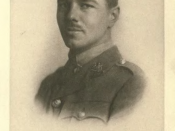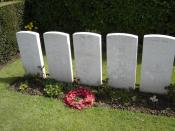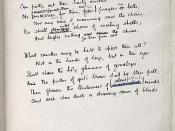Wilfred Owen - WW1 Poetry Wilfred Owen, an officer in the 1914-18 war, was driven by two major forces: the love of his fellow fighting men and the need to bring home to the people of Britain the horrific realities of the Great War, (Hibberd ,1986, p109). After meeting Siegfried Sassoon in 1917 at Craiglochart, a psychiatric establishment, Owen's poetry took on a new maturity. While both had enlisted, and both were acknowledged for the courage, their poetry expresses shock & disillusionment with the war. Owen's experience led him to write poetry full of anger and compassion for the suffering and waste of war. Three of Owen's poems Dulce est Decorum Est , Anthem for Lost Youth and Strange Meeting epitomise these concerns. Unlike Sassoon, Owen's poignant poetry was not published until after his death at 25, four days before the Armistice.
In June 1917 simultaneous underground explosions left only a few German survivors and another battle began in late July with the Germans re-forming and bringing up reserves.
This battle was fought in mud so deep that wounded men fell into shell holes and drowned. For the first time Germans used the blistering burning Mustard Gas which, along with the mud and water, caused persistent casualties long after its release. 245,000 British were lost and the Germans almost double that.
(http//www.emory"æhtml) First written in 1917, Owen's poem, deals specifically with the effects of mustard gas on a group of fatigued and confused soldiers returning to camp. It seethes with barely contained anger. The title, "it is sweet and glorious to die for one's country" is counter-pointed by "Bent double, like beggars under old sacks" and the soldiers, "Knock-kneed, coughing like hags, we cursed through the sludge," The second stanza moves away from the structured order of the first;...


